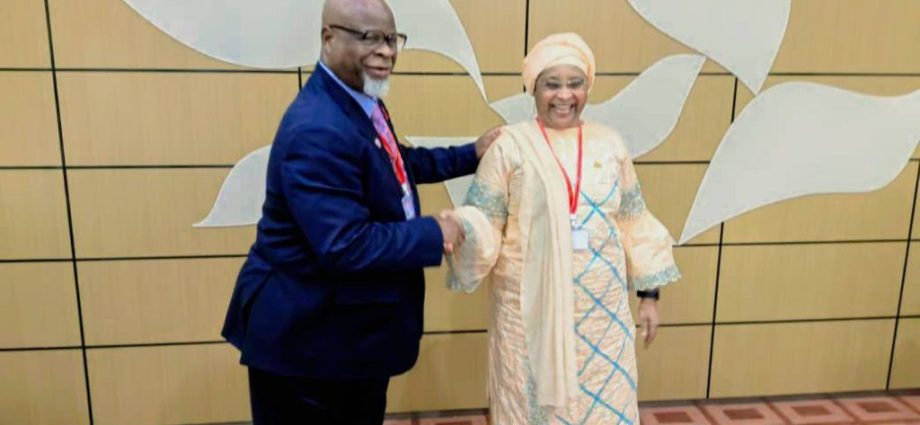Mali and Zambia Forge Stronger Health Partnership at WHO Regional Meeting
On the sidelines of the 75th session of the WHO Regional Committee for Africa, Mali’s Minister of Health and Social Development, Assa Badiallo Touré, met with her Zambian counterpart, Dr. Elijah Muchima. The high-level meeting, held in Lusaka, aimed to strengthen South-South cooperation and explore collaborative opportunities in public health between the two nations.
A Warm Exchange of Diplomatic Courtesies
Minister Touré began by expressing her gratitude to the Zambian authorities for their warm hospitality and extended congratulations to Dr. Muchima for both his appointment as chair of the 75th session and the seamless organization of the high-level meeting. Such diplomatic gestures, though customary, often set the tone for deeper, more substantive dialogue—and this encounter was no exception.
But what does it truly mean when two health ministers from different African nations sit down together? Is it merely protocol, or is it a sign of a shifting paradigm in how African countries are choosing to confront shared health challenges?
Mali’s Health Landscape: Progress Amid Challenges
Despite operating in a context of significant socio-economic and security challenges, Mali has made notable strides in its health sector. Minister Touré highlighted the country’s pyramidal health system, a structured approach designed to maximize resource allocation and service delivery from community to national levels.
She also shed light on the ongoing États Généraux de la Santé (General States of Health), a national consultative process aimed at reforming and improving Mali’s healthcare system. This initiative reflects a commitment to inclusive, bottom-up policymaking—a vision she attributed to Mali’s Transition President, General Assimi Goïta, who emphasizes national sovereignty and the strategic interests of the Malian people.
Key Areas for Collaboration
Minister Touré proposed several concrete areas where Mali and Zambia could deepen their partnership:
- Local production of medicines and vaccines to reduce dependency on imports and strengthen health security
- Training of health personnel to address workforce shortages and improve service quality
- Fighting breast and prostate cancers, which represent a growing burden across the continent
- Prevention of infectious diseases through shared research and resource mobilization
She also took a moment to thank the Zambian government and people for welcoming the Malian community residing in Zambia—a nod to the human dimension of international relations.
Zambia’s Perspective: Shared Challenges, Shared Solutions
Dr. Elijah Muchima welcomed Minister Touré’s proposals and emphasized Zambia’s commitment to inter-African cooperation in health. He acknowledged the critical role such partnerships play in addressing common challenges, from disease outbreaks to health worker migration.
One issue both ministers agreed requires urgent attention is cancer care. Dr. Muchima pointed to the high prevalence of cancer in Zambia and the exorbitant cost of medical evacuations for treatment abroad. In response, Zambia has embarked on an ambitious plan to construct three major cancer treatment centers—a testament to the country’s commitment to retaining expertise and care within the continent.
Like Minister Touré, he stressed the importance of collaboration in medical training and community health, recognizing that health systems are only as strong as their most localized units.
The Bigger Picture: South-South Cooperation in Health
This meeting was more than a bilateral exchange—it was a microcosm of a broader movement toward South-South cooperation in global health. For decades, African nations have relied heavily on partnerships with Western countries or international organizations for funding, technical assistance, and policy direction. But times are changing.
Increasingly, African leaders are looking to each other for solutions. They are sharing experiences, pooling resources, and co-designing strategies that reflect regional realities rather than imported models. This shift is not just practical; it is political. It signals a desire for greater autonomy and a more assertive role in global health governance.
Could this be the beginning of a new era in African health diplomacy? One where ministries of health become hubs of innovation and collaboration, not just implementation arms of foreign aid?
A Symbolic Conclusion
The meeting concluded with an exchange of gifts—a gesture that may seem ceremonial but symbolizes mutual respect and a shared commitment to future collaboration. In the world of international diplomacy, such moments often lay the groundwork for tangible outcomes.
What’s Next for Mali and Zambia?
While the meeting was rich in dialogue, the real test will be in the follow-up. Will working groups be formed? Will joint funding proposals be developed? Will training programs be co-designed? These are the questions that will determine whether this fruitful meeting translates into lasting impact.
For now, the message is clear: Mali and Zambia are keen to write a new chapter in health cooperation—one built on shared challenges, mutual respect, and a common vision for a healthier Africa.
Source: Communication Network of the Malian Ministry of Health and Social Development


